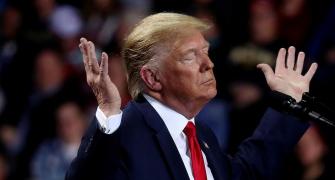Chairman of the second Administrative Reforms Commission Veerapa Moily has presented his report 'Combating Terrorism: Protecting by Righteousness' to Prime Minister Manmohan Singh and beseiged Home Minister Shivraj Patil.
"The nature of terrorism today is shifting from traditional international style of the late 20th century into a new form of transnational non-state warfare," he wrote in the preface of 186-page report.
The report deals with how to curb funding of terrorist activities, which includes money raised through buying of properties.
"There are several types of terrorim, which includes ethno nationalist terrorism, religious terrorism, which is prevalent everywhere, ideology-oriented terrorism, right wing terrorism, state sponsored terrorism and narco-terrorism. There is a need for a comprehensive anti-terrorist legislation to deal with the terrorists," Moily said in the report.
The committee, which redrafted the report on the administrative reforms commission, felt a multi-prognged strategy comprising of political, good governance and socioeconomic development, respect for rule of law, countering the subversive activities of terrorists, providing the appropriate legal framework aspects should be kept in mind while dealing with the terrorist menace.
The report also emphasised the need to define more clearly those criminal acts which can be constured as being terrorist in nature.
"There would be a review committee who would review cases every three months," Moily said at a crowded press conference at Vigyan Bhavan in New Delhi.
He refused to answer political questions about the timing of the report, which sought to bail out the home minister from the allegations of being unable to handle terrorist crime.
"A Federal agency should be set up to investigate terrorist crimes. Officers of proven record from CBI should be allowed to serve the agency. Both the new agency and the state governments can separately register the cases, but it is the special agency that would decide which one it is going to investigate and which one should be left to the state police," he said.
Interestingly, a 16-page chapter on intelligence gathering has been left blank.
"We do not want terrorists to know what we are doing. That would enable them to have a counterstrategy," he said amidst laughter as none of the journalists was willing to buy that argument.







